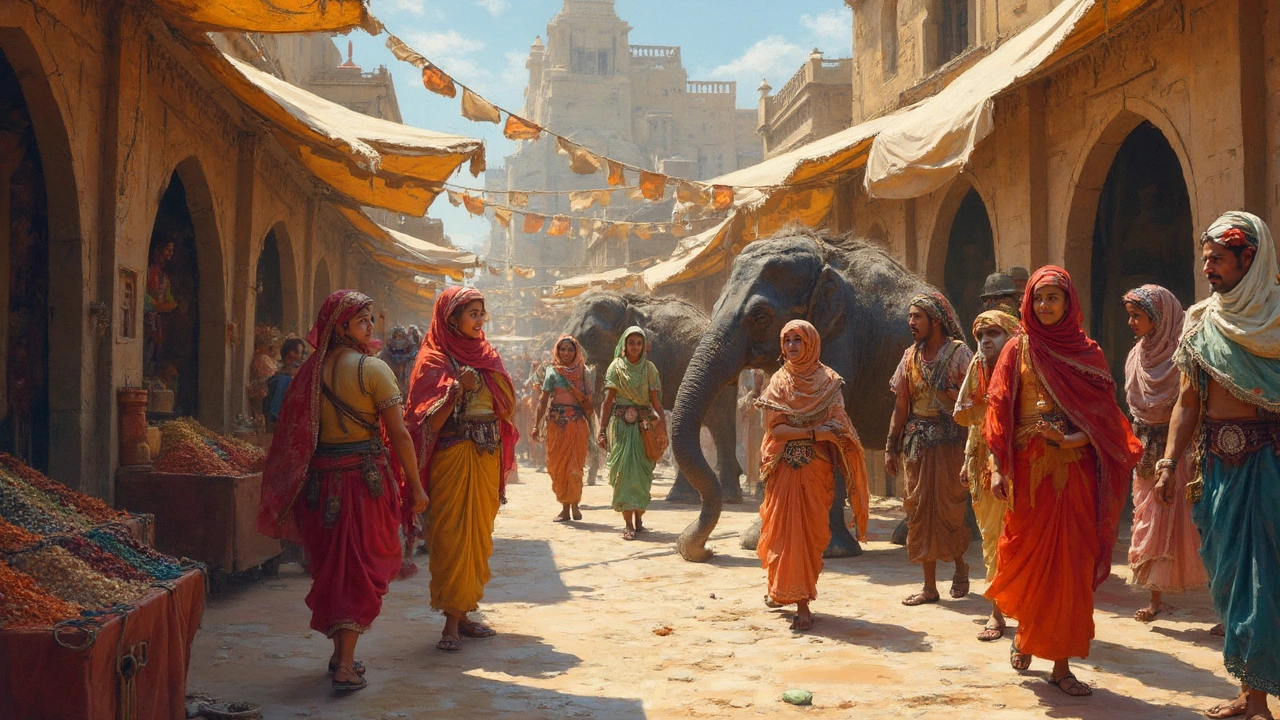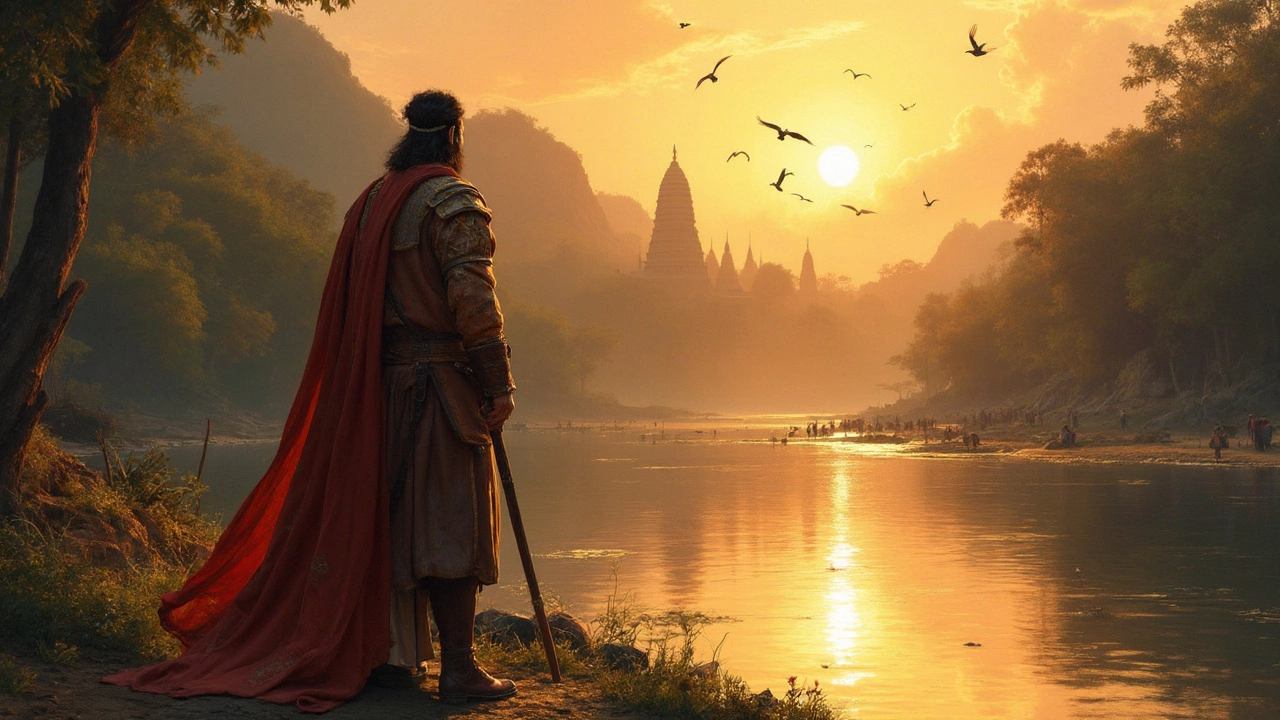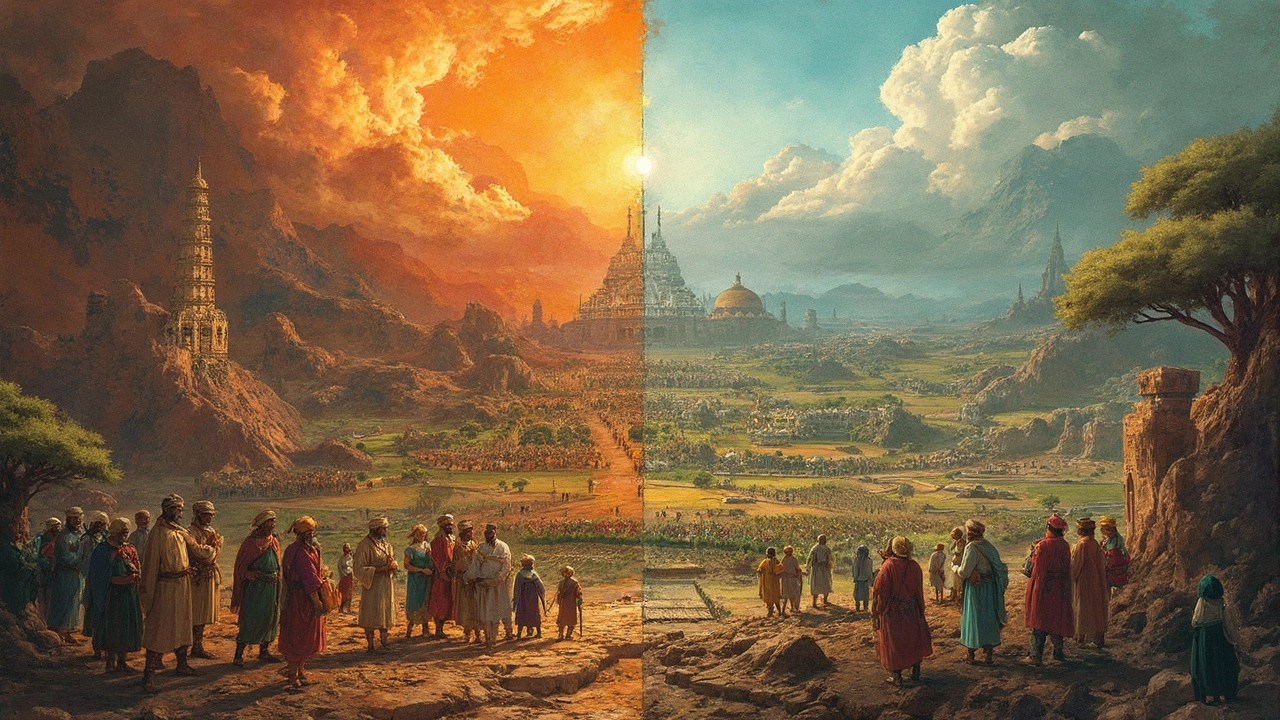Marco Polo's Words on India: What He Really Saw and Said
 May, 2 2025
May, 2 2025
Ever wondered what a medieval traveler from Venice thought when he landed in the heart of India? Marco Polo didn't just pass through—he left pages full of observations, descriptions, and yes, some wild stories about what he saw here. If you’re only familiar with the stereotype of spices and elephants, you haven’t heard the half of it.
Think about it—this is a guy who journeyed by camel and ship, without Google Maps or even a halfway decent guidebook. When Marco Polo talked about India, he wasn’t just jotting down notes; he was blown away by things we might take for granted today. His words still give us a window into ancient India, and they show how much surprise and curiosity a traveler can feel.
What did he really say about India? The answer isn’t just a list of quotes but the entire vibe he got—a mix of jaw-dropping amazement and the kind of practical observation you’d expect from a trader. His tips and stories are not just old history; they’re a chance to see India through the wide-open eyes of someone seeing it for the first time. If you’ve got a curious mind, there’s a lot to unpack from what Marco Polo wrote.
- Who Was Marco Polo and Why Did He Visit India?
- Real Quotes: What Marco Polo Said About India
- The Things That Amazed Marco Polo
- How Did India Inspire Marco Polo?
- Marco Polo’s Impact: Myths vs. Facts
Who Was Marco Polo and Why Did He Visit India?
If you check any history book, Marco Polo jumps out as a name straight from adventure tales. Born around 1254 in Venice, he came from a family of merchants who already had their eyes set on distant lands. Marco wasn’t some bored noble looking for a hobby—his family made a living by trading, and his father and uncle had already crossed into Asia long before he tagged along.
His big journey started when he was about 17. We’re talking late 1200s, a time when a trip from Italy all the way to China or India wasn’t just a long haul—it could take years and go seriously sideways at any point. His father Niccolò and uncle Maffeo were heading back to meet Kublai Khan, the Mongol ruler, and Marco Polo joined them for this trip.
So why did Marco Polo visit India? Simple: trade and curiosity. India was a goldmine (sometimes literally) for merchant families. Spices, textiles, precious stones, and pearls—Europe had barely scratched the surface on what India could offer. Plus, India was smack in the middle of old trade routes connecting Europe, the Middle East, and Asia.
Here’s what stands out about his visit:
- He stopped in several Indian ports and kingdoms, including places like Gujarat and Tamil Nadu.
- He didn’t come to conquer or preach—he wanted to learn, trade, and write about what he found.
- He collected not just goods but stories, picking up all sorts of local customs and sights that blew his mind.
According to records, Marco Polo spent a good chunk of time around 1292 in the southeast coastal region, waiting for the right winds to take him back toward China—so he really saw daily Indian life up close.
If you’re wondering about the numbers, some estimates from trade records in Venice suggest that by the late 1200s, over 15% of luxury goods in certain markets came from India—mostly spices and fine cotton. No surprise Marco Polo wanted to see what all the fuss was about.
Real Quotes: What Marco Polo Said About India
When people mention Marco Polo and his trips to India, they usually think about big tales. But the real gold mine is in the actual words he wrote down. Marco Polo’s descriptions cut through myths and show us what he truly saw and felt during his travels. Let’s pull up a few of his genuine quotes—straight from his book, ‘The Travels of Marco Polo.’
He didn’t mince words about how different Indian life was from his home in Venice. Polo wrote, “The people of this country eat no meat, drink no wine, and worship idols.” He was amazed to see vegetarianism as a whole way of life, something new and strange to a meat-eating European.
Another eye-opener for him? Spices. He said, “Pepper, ginger, cinnamon, and other spices grow in this region in greater abundance than in any other part of the world.” It’s wild to think these words kickstarted the spice-craze in Europe and led to centuries of trade with India.
Polo also described Indian rulers. “The king is a man of justice and great power,” he notes, with special mention of the southern kingdoms, highlighting their fair systems and love for elephants—one of the first detailed outsider accounts of India’s elephants in royal armies.
- “They have a custom that whenever they eat, they first wash their hands and their mouths very thoroughly.”
- “They go naked, except that they are covered from their loins down to their knees with a piece of cloth.”
- “The country is the most productive in the world; it is the source of precious stones, spices, and so many other rare things.”
Polo didn’t sugarcoat the stuff he found strange either. He mentioned how the castes worked, saying, “There are a number of classes, each with its own trade or occupation, forbidden to mingle with the others.”
| Quote Topic | Direct Polo Quote |
|---|---|
| Food/Habits | "The people eat no flesh, nor do they kill any living creature; they live on rice and milk and corn." |
| Trade/Spices | "There is more pepper in the district of Malabar than in the whole world besides." |
| Animals | "Great numbers of elephants, used for war and for all manner of work." |
| Social System | "The natives are divided into classes, each with its own laws and customs, from which they never depart." |
If you’re after an honest picture—these Marco Polo India quotes are it. They’re straightforward, sometimes blunt, always meant to record what really stood out for him as a foreigner. These snippets still show up in travel blogs and history documentaries, reminding us that first impressions can shake up the whole world’s view of a place.

The Things That Amazed Marco Polo
When Marco Polo set foot in India, he wasn’t shy about his sense of wonder. The climate, the people, and even simple things like the food were totally new to him. What jumped out at Marco, and what he made sure to mention in his writings, still reads like a tour guide for first-time visitors.
The sheer size and bustle of Indian cities caught his eye. He wrote about big markets packed with traders, massive crowds, and goods he’d never seen before. The variety of spices wasn’t just impressive to his senses—it changed how Europeans saw world trade. One of Marco Polo’s genuine lines from his travel book, The Travels of Marco Polo, goes:
"Pepper and ginger grow in such abundance that it seems as if they were nothing but roots and vegetables."
He also described seeing elephants used for work and war, which blew his mind coming from Europe where horses were the main animals for just about everything. Polo noted how kings and wealthy families rode elephants for status and protection. These weren’t the parade animals you see in cartoons—these were part of daily life and power moves.
Here’s what else caught Marco Polo off guard:
- Precious stones like diamonds and rubies just lying in riverbeds, something he described with shock and a hint of disbelief.
- Brilliant, colorful clothing that local people wore at a time when Europe’s wardrobe didn’t come close in variety.
- Strange animals like peacocks and monkeys roaming the streets, part of everyday sights instead of the royal gardens he was used to.
Religious variety also surprised him. He wrote about meeting Hindus, Jains, Muslims, and Buddhists living side by side, worshipping in different ways. There are even records of him talking about sadhus and yogis performing acts he called “almost magical.”
Although he sometimes exaggerated, the main takeaway from Marco Polo was: India was something special, totally unexpected, and endlessly interesting. Even now, people searching for Marco Polo stories in India are practically following in his footsteps—hungry for that same wide-eyed thrill.
How Did India Inspire Marco Polo?
It’s hard to imagine just how eye-opening India must have been for Marco Polo. He arrived from a completely different world, and suddenly he was hit with new sounds, flavors, and customs everywhere. In fact, it blew his mind. Marco Polo’s writings make it clear that he saw India as a land packed with opportunity and nonstop surprises—he just couldn’t stop talking about the little things that added up to something huge.
One of the things that stood out to him was the bustling trade. He couldn’t help but notice India’s booming markets full of spices, gems, and all sorts of riches. He literally called out how “pearls, precious stones, and other valuables are found in abundance.” No surprise, he was all about business, and he saw India as a place where deals were always on the table.
Then there was the culture. Marco Polo wrote about the mix of religions, traditions, and ways of living. He was especially interested in how people handled daily life—what they wore, what they ate, and how they ran their towns. He even mentions, a bit amazed, that there were communities full of people who ate only veggies. For a Venetian used to a lot of seafood and meat, that must have been wild.
But he didn’t just observe, he shared his opinions. Here’s a quote that gets to the heart of his reaction:
"The people of this country are very honest and truthful… and they do not kill any living thing, nor do they drink wine or eat anything that has blood in it."
(This is from his book, The Travels of Marco Polo.)
He was also fascinated by India’s animals—elephants being his favorite by far. He wrote pages about how they were used for work, war, and even parades. For Marco Polo, seeing these gigantic animals being part of daily life was almost unbelievable.
Here’s a quick look at a few things that inspired him, straight from his own notes:
- Marco Polo admired India’s open-air markets and the sheer variety of goods.
- He appreciated the dedication to religion, calling Indian temples and rituals “powerful and mysterious.”
- He learned about local laws and the non-violence practiced by some communities—something he mentioned again and again.
- The wildlife, especially the elephants and peacocks, really stuck with him.
Marco Polo’s words boosted Europe’s curiosity about India. His stories sparked imaginations, pushed explorers to come this way, and even helped merchants dream bigger. These honest Marco Polo quotes on India turned into inspiration for everyone back home, proving that simply seeing the world with open eyes changes you and everyone who listens to your stories.

Marco Polo’s Impact: Myths vs. Facts
When most people hear the name Marco Polo, they think of the legendary explorer who single-handedly introduced India and its riches to Europe. But here’s the thing—his impact isn’t as straight-up as the legends claim.
First, the myth that Marco Polo was the very first European to reach India is shaky. Sure, his account is one of the earliest and most detailed, but he almost certainly wasn’t the first. Traders from Rome, Greece, and even earlier Arab merchants had already set foot in India centuries before him. What set his stories apart was how widely they spread and how much they fired up everyone’s imagination about the East.
- Marco Polo's India quotes were sometimes full of wonder, but also mixed with exaggeration or second-hand tales. For example, his stories about diamonds being picked from deep valleys with the help of meat and eagles sound wild, and probably are. Today, historians agree that he heard some tall tales during his travels and passed them along.
- Another popular myth: Polo brought back silks, spices, and wealth to Europe. Actually, he arrived just after the peak era of the spice trade, and he didn’t return home with mountains of treasure. Instead, his real contribution was the stories and information he shared, which opened up new goals for future traders and explorers.
If you’re curious about how much of an effect his writings actually had, check out this short table comparing real vs. popular beliefs:
| Popular Belief | Reality |
|---|---|
| First European to India | Not even close. Other Europeans and Middle Eastern traders got there before him. |
| Brought riches back from India | He mostly brought stories, not treasure. |
| Saw everything himself in India | Some details are hearsay or based on local stories. |
The big fact is, Marco Polo made India sound mysterious and magical for his readers back home, using real India quotes mixed with rumor. If he made any lasting impact, it’s in how he sparked Europe’s hunger to visit and trade with India. His book was like a medieval travel blog—sometimes reliable, sometimes wild, always inspirational.